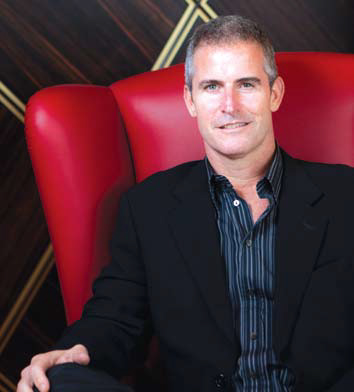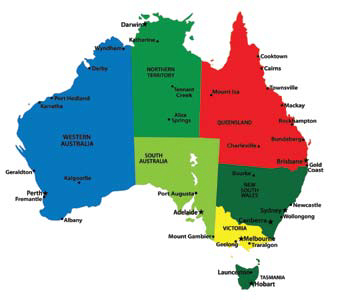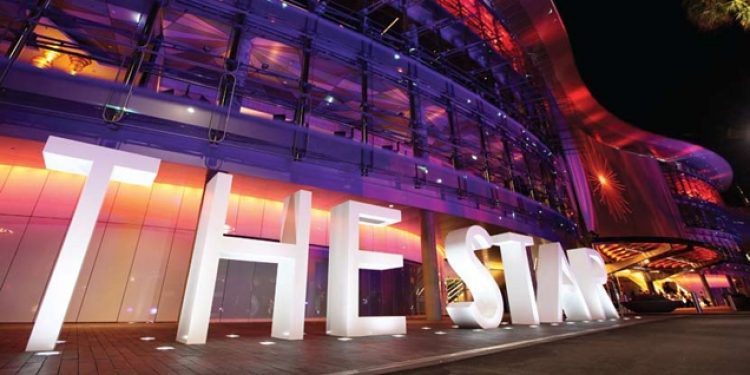A drama the likes of which this industry rarely sees is unfolding Down Under—a battle for control of the only casino in Australia’s largest city, and with it an airtight monopoly of Australia’s precious trade in high-rolling Asian gamblers, a business worth upwards of AU$25 billion in annual turnover.
As hostile takeovers go, it’s got it all: intrigue, duplicity, skullduggery, conflicts of loyalty and ambition, allegations of sexual misconduct and, of course, lots and lots of money.
Heading the cast is James Packer, 44-year-old heir to an empire founded on Australian newspapers, television networks and casinos, most of it consolidated by his father, Kerry Packer, a brash, outsized character of outsized ambition and appetites who died in 2005 the country’s richest man. The younger Packer, somewhat less rich— ranked No. 4 or No. 6 these days, worth somewhere between AU$4.5 billion and AU$5.2 billion, depending on what you read—has cast a covetous eye on The Star in Sydney, with its 1,500 electronic gaming machines, 210 table games, 651 five-star hotel rooms, 3,000-seat entertainment venue, an enviable location on Darling Harbour and New South Wales’ only casino license, good through 2020.

“Shrewd and successful” – James Packer
Like rich men everywhere, Kerry Packer’s avocation was separating other rich men from their money, and he was both a gambler of titanic proportions, winning or blowing millions in a night at the tables in Las Vegas or London, and a substantial owner of gambling houses. He bequeathed to his son the largest casino in the Southern Hemisphere, Crown Entertainment Complex, as it’s now called, in Melbourne, Australia’s second city and capital of the state of Victoria. The inheritance includes the country’s second-largest casino in terms of total gaming positions, Burswood Entertainment Complex in Perth in Western Australia.
Looking at his biggest investments to date, James clearly believes his destiny resides with resort-scale casinos. He’s spent hugely on them, and aggressively, and so far not all that successfully. With The Star set to finally harvest the fruits of three years and some AU$870 million in capital investment designed to transform it into a premier destination for Asia’s gambling elite—placing it in direct competition with Crown, which bills itself as “one of the largest single-site VIP operations in the world”—his desire to prove something may never be more urgent than it is now. To do this he’s prepared to relinquish the family’s last significant media holdings.

Crown Entertainment Complex, in Melbourne, Australia
Opposing him is the embattled board of directors of fledgling Echo Entertainment, which had been led until this month by Chairman John Story, a lawyer and former chairman of Australian betting giant Tabcorp Holdings. The CEO, Larry Mullin, is an American who served as president of the US$1.2 billion Borgata in Atlantic City before joining Tabcorp as chief executive of its Casino Division in 2009, just as the remodeling of The Star was getting under way. Mr Mullin’s division included three casinos in the northeastern state of Queensland: Jupiters Hotel & Casino on the Gold Coast and Treasury Casino & Hotel in Brisbane, both near the NSW border, and Jupiters Hotel & Casino farther up the Pacific coast in Townsville.

Larry Mullin
Echo was created only last spring in advance of Tabcorp’s decision to get out of the casino business. Tabcorp formally spun off The Star and the Queensland casinos last June with Echo (ASX: EGP) as their new publicly traded parent.
The company has been fighting for its life ever since.
Through entities controlled by Crown Limited (ASX: CWN), Mr Packer earlier this year doubled his stake in Echo. He now owns just under the legal limit of 10%, an interest valued at AU$250 million. Under the terms of Echo’s constitution and NSW law he can’t own more without regulatory approval. As a prelude to acquiring a controlling share, or perhaps as an alternative, he demanded a directorship. Echo refused. “We do not believe that it is in the interests of shareholders that a competitor be represented on the board,” Mr Story said in a statement released last month. It was a view that appeared to have the backing of the seven-member board, until Mr Packer leveraged Crown’s standing as a major shareholder to force a vote on Mr Story himself, whose leadership Mr Packer has blasted in the Australian press as “disastrous”. Mr Packer, or rather Crown, proposed a resolution, which was scheduled for a 20 July vote, that Mr Story be removed “with immediate effect” and replaced by former Victoria Premier Jeffrey Gibb Kennett, a one-time ad man and current president of the Australian Football League Hawthorn Hawks, whose ties to the Packers date back to his days as leader of the center-right Liberal Party in Victoria. As premier in the late ’90s he supported the redevelopment of Crown Casino and its move to its current location. He “has a great understanding of what major cities need as tourism drivers,” Mr Packer said of him in a recent interview. “Anyone who knows Jeff Kennett knows he has the drive, enthusiasm and knowledge to help the Echo board fix its numerous problems.”
Mr Story contended, “These moves by Crown should be viewed through the prism of its ardent desire to gain control of Echo’s valuable licenses without paying a premium to Echo shareholders.”
But on 8 June it was announced in the Sydney Morning Herald that Mr Story had resigned. The board issued a statement, saying the “ongoing disruptive campaign for the removal of Mr Story was damaging to the company, and that it was in the best interests of shareholders that Mr Story not contest the resolution.”

Battle lines are drawn
Caught Texting
Whether, as Mr Packer claims, The Star is beset by “substandard management” and “poor performance” is debatable. In his allusions to the company’s “numerous problems” he speaks more accurately, although he may be revealing more than he intends.
In February, Echo announced the departure of The Star’s Managing Director Sid Vaikunta, a Mullin protégé who had held senior development and marketing positions at Borgata and its coowner Boyd Gaming before joining Mr Mullin in Sydney in 2010. Mr Vaikunta had been the subject of an internal investigation into allegations of sexual harassment involving two female managers at the casino. Within days, media reports were swirling with various “leaks” purporting to reveal that operations at the casino were rampant with sexism, drug use among senior executives and general bad behavior.
Eight days after Mr Vaikunta’s departure was reported, Crown announced it had doubled its stake in Echo.
In the meantime, the publicity surrounding the leaks forced the NSW Independent Liquor & Gaming Authority, which had just completed a five-year review of The Star’s license in December, to launch another investigation, headed by Gail Furness, the third-party attorney who had overseen the earlier review. While this was under way, Australia’s ABC television network went on the air with the leaked identities and betting histories of some of the casino’s biggest players. Echo got an injunction from the country’s highest court forcing the information off the network’s website. The court also suppressed publication of reports by casino staff and government inspectors about alleged incidents of misconduct at the property. Echo also sought the surrender by ABC of all relevant documents and a guarantee it would not use them in future stories. Those documents also were subpoenaed by the ILGA investigation.
The timing isn’t the only intriguing part of all this. It appears the NSW government, directly or indirectly, may be playing a role in furthering Mr Packer’s ambitions.
ILGA’s inquiry revealed that one of Mr Vaikunta’s alleged victims was at the time the girlfriend of Peter Grimshaw, communications director for Liberal Party Premier Barry O’Farrell. Mr Grimshaw had been media and government relations director at The Star at the time the alleged harassment occurred. His girlfriend, a human resources director, subsequently was sacked by The Star, allegedly for leaking confidential information about the casino.
If it wasn’t some form of not-so-subtle sabotage it certainly looked like it. Echo, believing a conspiracy was afoot, decided to come forward with some leaks of its own. One of them was that Mr Grimshaw, during his tenure at The Star, had contacted a member of the O’Farrell government about the harassment charges. That was Norm Lipson, media adviser to Hospitality Minister George Souris. The news prompted the ILGA to expand the scope of its inquiry, which now was concerned with the question of whether individuals both in government and out had attempted to influence its review of The Star’s license.
Echo then released to the newspapers a series of text messages showing that Mr Grimshaw and his girlfriend had discussed ways to get rid of Mr Vaikunta, and that Mr Grimshaw had discussed but hadn’t acted upon a plan to call members of the Echo board about the casino’s investigation of Mr Vaikunta, and that Mr Grimshaw had discussed contacting board members posing as the woman’s husband, which wasn’t acted on either.
On the second day of the ILGA inquiry, Echo’s lawyer confronted Mr Grimshaw with three more of his texts. The first, dating back to August 2010, read: “I just told Barry what a [expletive deleted] Sid is. He said we might all have to give Star a wake-up call when I leave.” The other two, dating to November 2010, read in part: “Barry just texted me. Just asked me if I was out yet. I think they are going to smash Star.”
Under cross-examination, Mr Grimshaw disavowed any memory of the texts. He resigned from the government later that day.
The Stakes
The ILGA and Ms Furness concluded their investigation at the end of May with a finding that The Star and its management had done nothing wrong, that there was no substance to any of the allegations, and that the company’s internal investigation, which had upheld the charges against Mr Vaikunta, had been conducted “promptly, properly and thoroughly”. Nor was evidence found that anyone inside government or out had tried to influence its review of The Star license.
The authority, however, has ordered The Star to explain why it didn’t inform ILGA as soon as it had taken action against Mr Vaikunta, suspending him back in December, according to news reports. The casino had until 21 June to respond.
Mr O’Farrell, who has come under fire over the Grimshaw revelations, refused to disassociate himself from the actions of his former aide. No doubt he doesn’t appreciate the embarrassment Echo has caused him. He remains a professed fan of James Packer, whom he’s praised as a “shrewd and successful businessman.”
“I don’t own shares except in a local community bank,” he recently told SMH, undeterred by Mr Packer’s pending application for approval to increase his stake in Echo, “[but] the fact is I’m sure shareholders are impressed with the success that Crown’s had in recent times.”
Which must be galling, under the circumstances, to a company that has invested almost AU$900 million in your largest city, and Echo let its displeasure be known. The company “does not believe it is appropriate to be commenting on a matter that is currently under consideration by the independent regulator,” a spokesman said.
“Shrewd and successful” Mr Packer may be, but his investments, mostly in gaming, have left his empire about AU$2 billion lighter than when he took over. Most were questionable bets on Las Vegas, most made between May and December 2007 at a time when America’s sub-prime mortgage disaster was well under way and the global financial crisis was darkening the horizon:
- A US$242 million investment in Station Casinos, the largest suburban operator in Las Vegas, which filed for US Bankruptcy Court protection under a mountain of debt in 2009.
- A US$172 million investment in Harrah’s, now Caesars Entertainment, subsequently written off as a loss.
- Fountainebleau Resort Las Vegas, in which Crown holds a 19.6% equity interest bought for AU$333 million, another loss. Only partially completed, the project ran out of funding and wound up in bankruptcy in 2009. The unfinished 68 story hulk was sold to Carl Icahn for US$156 million.
- Others Mr Packer was lucky to escape from cheap, like the US$22.5 million he sank into the abortive Crown Las Vegas, a resort that was supposed to include the second-tallest skyscraper in the world.
- And his US$420 million, 24.5% stake in Cannery Casino Resorts, which operates three gaming halls in the Las Vegas suburbs and a racino in the city of Pittsburgh in western Pennsylvania. He originally wanted the entire company and was going to pay US$1.75 billion for it.
In the UK, Crown owns 50% of Aspers, an operating company consisting of four small casinos in Newcastle, Northampton, Stratford and Swansea, the last one reported to be hurting badly and on the verge of closing.
Crown also owns 50% of the Australian business of UK-based Betfair, the world’s largest online betting exchange, although this actually was Kerry Packer’s deal.
It was also Kerry that got the family into Macau, arguably the most successful of the Packer gaming holdings. This was the deal that has evolved into today’s publicly listed Melco Crown Entertainment, a joint venture with Stanley Ho’s son Lawrence. Melco Crown operates the Altira and City of Dreams resorts and holds a majority interest in a third, Studio City, which has yet to be built.
With ownership of The Star, not to mention Echo’s three Queensland resorts, all would seemingly be redeemed for James Packer. He would be the undisputed lord of casino gambling in Australia, with something like a controlling 40-45% interest in a merged entity worth an estimated AU$10 billion. Factor in the Macau investment and it seems clear that a very significant chunk of Asia’s high-rollers, who comprise most of the biggest players in the world, would be Crown customers.
The VIP trade in Australia generated AU$24.7 billion in turnover in 2010 and is growing annually at double-digit rates, according to Larry Mullin. The massive investment in integrated resorts in Macau and Singapore, together with increasing levels of outbound travel from mainland China, have galvanized the market. In Australia, Crown currently controls an estimated 80% of it, by Mr Mullin’s estimation. The balance largely belongs to Echo’s four casinos, and most of that to The Star.
UBS estimates that by 2014 the Australian VIP market could be worth up to US$100 billion in turnover, driven by visitation from China that is expected to hit 16 million.
“Eighty percent of travelers out of China end up going to a gaming venue on their first trip,” notes David Waidsowski, a media and entertainment partner at PWC Sydney. “With the recent renovations at The Star, they are trying to do as much as they can to attract as many as they can.”
“It’s a very profitable segment,” Mr Mullin has said.
This is especially the case in Australia, competitively speaking. New South Wales and Queensland levy the lowest tax on VIP play in the region, 10%, versus Singapore’s effective rate of 12% and Macau’s nearly 40%.
Echo reported “difficult” trading conditions so far in the second half of FY2012, the result of “soft consumer sentiment” and “weak demand”. Still, gross revenues company-wide were up 3.1% through 28 May, most of that driven by The Star, where revenues rose 5.5% despite the “sustained negative media exposure and management changes”.
Revenue growth in “International Rebate Business,” as the company terms VIP, was up 2.3% on higher than normal win and substantial volume (as measured by customer front money) growth of 58.7%. But the liquidation of junket operator SilkStar Global Marketing, which Echo helped set up in business in January 2011 with AU$7 million in development fees and prepaid commissions, has forced the company to write off an additional AU$22.9 million in gambling debts assumed to be uncollectable.
The company is due to report full-year earnings in August.
The taint from the inquiry continues to linger as well, and the VIP push has been dealt a blow by the ILGA’s decision to deny a license to American Mark Brown, a highly respected veteran of Donald Trump’s and Sheldon Adelson’s casinos who’d been tapped as international marketing manager for The Star. Mr Mullin, a Brown protégé, said he did not know why the license was denied.
Putting the best face on it, he said, “The IRB business continues to develop momentum, and I am confident we have moved past the establishment phase and its associated initial costs. This year has been more challenging than anticipated … but with the inquiry behind us, a new managing director in charge at The Star, and our Sydney renovations close to completion, we look to the future with great optimism.”
As does James Packer, no doubt.
A full takeover of Echo will cost Crown an estimated AU$2.7 billion and likely will face lengthy scrutiny from competition authorities. But with Mr Story’s resignation it may not come to that. If it does, Mr Packer has a plan in motion. He has appointed UBS to negotiate the sale of his 50.1% stake in publicly traded Consolidated Media Holdings, which holds a 25% stake in pay TV operator Foxtel. The sale could be worth about AU$1 billion. In 2006, Mr Packer sold the family’s controlling stake in the Nine Network. If this latest sale goes through it would mean that for the first time in a century the Packer family will not have any major media interests in its home country.
He may need the money. Reports are that Echo has also piqued the interest of Malaysia-based conglomerate Genting, owner of Resorts World in Singapore. Macquarie’s Gary Pinge said, “Our analysis suggests that Genting Singapore could comfortably pay US$6.23 to $6.75 a share, a 35% to 50% premium to Echo’s current share price.”
At those numbers, Echo would have a market cap of US$4.7 billion.

























